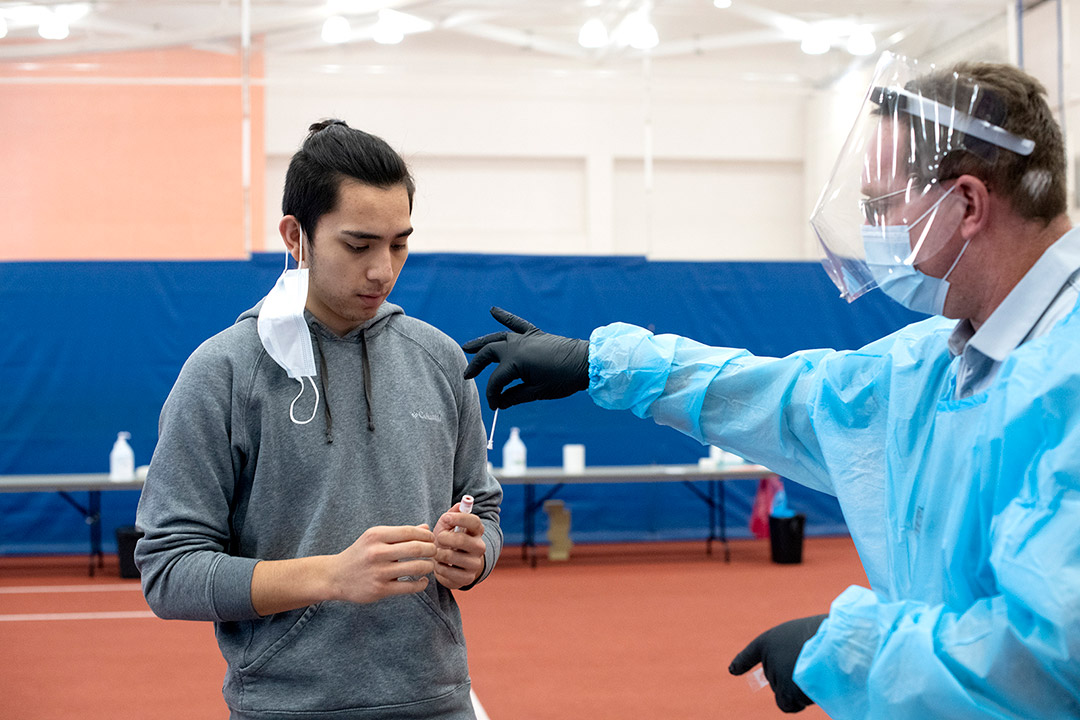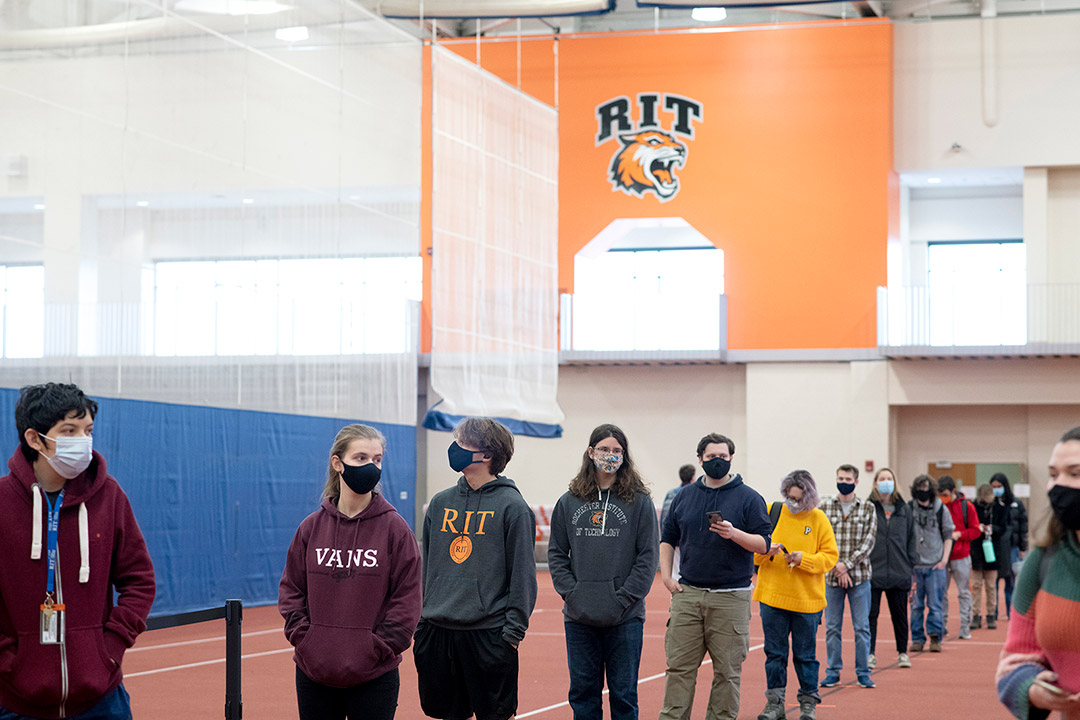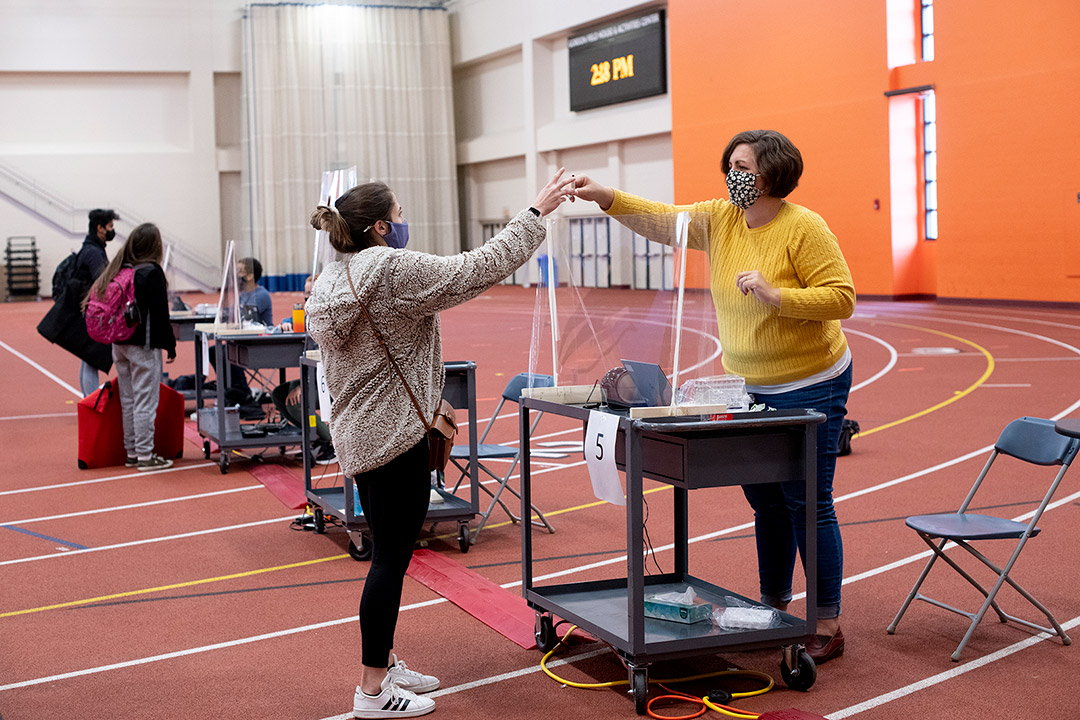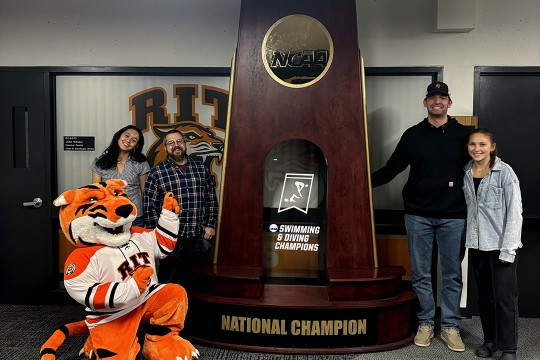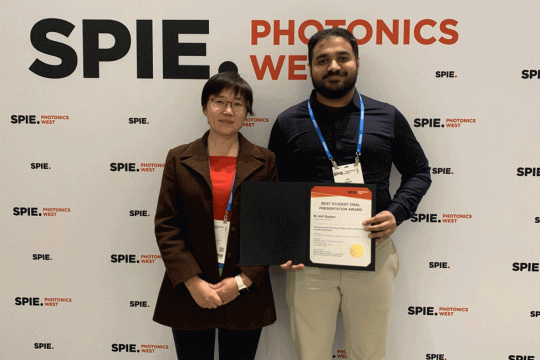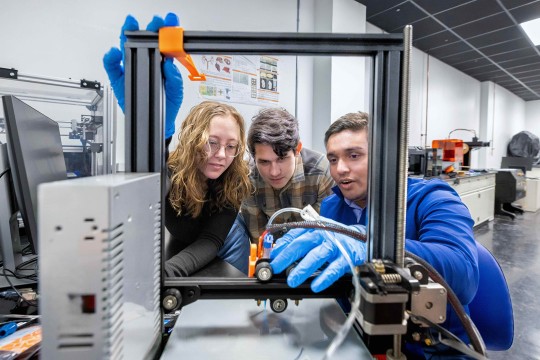Tiger Testing Team helped administer thousands of COVID-19 tests at RIT
More volunteers needed as saliva testing begins next semester
A. Sue Weisler
Rob Bauman, right, an athletic trainer, gives testing instructions to Joshua Ratusny, a first-year web and mobile computing major from Bowling Green, Ky.
Nearly 15,000 COVID-19 tests were completed on campus for Rochester Institute of Technology students this semester.
Students were tested if they showed symptoms, during surveillance testing done after wastewater sampling results, for student activity or behavior, or it was totally random.
More than 65 RIT staff members volunteered—often with little advance notice—with the Tiger Testing Team to set up testing stations and walk students through the process of sample collection.
Eight staff members from Athletics and Student Affairs made up the Tiger Testing Team. One was Phil Baretela, head swimming and diving coach, who had some free time because there was no competition this semester. Practice was also halted when the risk level was elevated to orange.
A. Sue Weisler
Students line up for free, voluntary COVID testing in the Gordon Field House prior to Thanksgiving break.
“I wanted to be doing my part to do whatever I could,” he said. “It is satisfying knowing I’m helping to do my part to provide some sort of peace to the students taking the test. And for those testing positive, we’re able to keep the community as safe as we can.”
Surveillance testing was routinely done three days a week. At times, when wastewater signals were very high, indicating at least one person in the affected building was shedding virus and possibly infectious, urgent testing events were initiated with the team starting as early as 6 a.m.
Most of the tests have been self-administered in the Gordon Field House, Student Life Center, or in the Wellness Center. In some instances where students were in isolation or unable to travel, the team made a house call and testing was done where the students were living. Students were checked-in and given a bar coded vial where they placed a swab after they collected a sample—circling the cotton swab inside each nostril. The vial was then capped and sent to Boston for analysis.
The team ensured all students invited to testing complied. They visited residence halls, emailed and called students to be sure those at risk completed the required testing.
“The volunteers were awesome. We couldn’t have done it without them. Their generous donation of time, compassion, and skill allowed for our campus to safely stay open throughout the fall semester,” said Dr. Wendy Gelbard, associate vice president, Wellness. “I hope we didn’t burn them out because we’re going to need them in the spring semester.”
RIT plans to initiate saliva testing on campus for the spring semester. It will be faster and allow for much greater testing capacity. However, saliva tests are considered surveillance testing, not diagnostic. Gelbard said RIT has been approved for pooled testing, so saliva samples will be combined in small groups and analyzed in a lab on campus, with results possibly in a couple of hours. Any saliva sample which indicates a positive COVID result would require additional diagnostic testing for those in the positive sample. Diagnostic testing would be either the anterior nasal swab tests that are sent to Boston or the deeper nasal swab tests that are processed locally.
She said even more volunteers—people from all across the campus—will be needed next semester as increased testing is expected. A Message Center announcement will be sent when volunteers may sign up.
Gelbard said none of the volunteers who helped with the tests contracted COVID as a result of their assistance with student testing. They all wore gloves, gowns, face shields, and face masks as they met with the students.
Baretela said he’s aware some of the students may have had COVID-19, but he wasn’t concerned about catching it.
“The closest we got to the students is on the other side of the table,” he said. “I’m not worried. I’m staying sanitary. We go in head-to-toe with protective equipment and remove everything safely and make sure I’m doing everything properly.”
Baretela was also impressed by the student body. Some students were tested multiple times, especially if they were involved in various groups, sports, or Greek organizations or if they lived in one of the residence areas with concerning wastewater signals.
“We never saw any ill-will. Most of the students were matter-of-fact about it, just wanting to get it done. It’s been fun interacting with them when we could. Some of the students are repeat customers and know the drill. And it’s been fun seeing some of my athletes come through.”
A. Sue Weisler
Sara Bayerl, right, an associate application and business analyst in Student Affairs, hands a COVID test to a student.
Sara Bayerl, an application and business analyst in Student Affairs, supported the testing team in the use of technology and data to track testing compliance. She was also trained how to check in the students who were being tested, and even how to conduct an audit of vials to ensure accuracy in the data. Although she never envisioned having to dig down into boxes to find and count medical vials, she was happy to help out as needed.
“I think everyone, especially in Student Affairs, had to shift our job focus and jump in to do whatever we needed to do to help us stay open and keep our community safe and our students successful,” Bayerl said. “There is an amazing team working on the project, many who volunteered their time away from their full-time jobs.”
Rob Bauman, an athletic trainer, started volunteering in August as students began moving in, making sure they were doing their daily health screening and making sure they had negative COVID tests before coming on campus. He also volunteered when tests were administered, nearly doing every task available.
“I think it was really important to keep the campus open for the social and emotional needs of all the students,” he said. “Everybody was really good about getting tested and I think testing really benefited everybody.”
Other core Tiger Testing Team staff members included Jeff Siegel, associate director of intercollegiate athletics; Joanna Adams, data specialist with Student Affairs; Jennifer Maltby, assessment manager and systems administrator; Jill Witkowski, marketing and communication specialist; and Emily Heyman, assistant director for events at University Arenas.
There were also seven student employees who helped with testing.
“The students and employees did a wonderful job following this new pandemic lifestyle,” Gelbard said. “Really, it was the behavior and actions of the entire campus community that made our fall semester so successful. Our students really wanted to be here. Their adherence to the three W’s made it possible: Wear a mask; Wash your hands; Watch your distance.”










